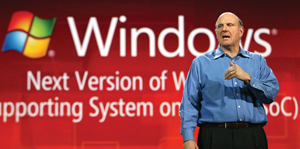News
Where Are the Windows Tablets?
Microsoft misses CES opportunity to wow industry with tablet innovation, but shows new foundations for future Windows-based devices.
- By Kurt Mackie
- February 01, 2011
Expectations were high that Microsoft would kick off the year at the Consumer Electronics Show (CES) in Las Vegas with a major tablet or slate announcement to claw back the momentum of the Apple iPad and Google Android-based devices.
Microsoft executives did indeed talk about tablets and slates at CES, but only in a way that guarantees to keep alive for many more months the question of whether Microsoft will be a serious player or an also-ran in the market for the devices.
Microsoft CEO Steve Ballmer kicked off CES with lots of positive stats, along with a few gizmos. The gizmos shown on stage -- which ranged from laptops and PCs to a single tablet device and a slimmed-down Microsoft Surface table-top device -- were quickly presented toward the end of the keynote talk by Michael Angiulo, Microsoft corporate vice president for Windows Planning, Hardware and PC Ecosystem.
Missing from the lineup was the Microsoft star attraction at last year's CES, the Hewlett-Packard Co. slate prototype, which Ballmer had prominently displayed.
HP currently offers its Windows 7-based Slate 500 Tablet PC, but the company also will create a slate device based on webOS, the operating system that HP acquired when it bought mobile device maker Palm in July.
The single tablet device presented by Angiulo was an Asus tablet running Windows 7. This device features a bright touchscreen that uses 20 percent less power than devices with similar-sized touchscreens, according to Angiulo. Users can apply colored "ink" on the screen using a special stylus. The screen can distinguish between a user's hand and the stylus, making it easier to apply the ink.
Angiulo also showed off some different PC form factors running Windows 7, including an Acer machine featuring dual touchscreens. The bottom screen of the Acer PC can serve as a keyboard for input. A Samsung PC on display has a keyboard that slides out from the body of the machine. Angiulo said that this Samsung PC was running the Intel Oak Trail CPU.
The tablet Ballmer had on stage was Windows 7-based. Microsoft's most significant CES tablet announcement, however, involved the next version of Windows.
Just before Ballmer's keynote, Microsoft announced plans to integrate its next-generation Windows client OS on system-on-a-chip (SoC) hardware and to use the architecture developed by Cambridge, U.K.-based ARM Holdings.
The SoC deals are wholly associated with what Microsoft described as its "next version of Windows." Many observers think that new client OS will be called "Windows 8," although Microsoft refused to describe it.
As part of this effort, Microsoft is working with chip-making partners that are leveraging the ARM architecture. Those partners include Nvidia Corp., Qualcomm Inc. and Texas Instruments Inc., according to the Microsoft announcement. The announcement was quick to add that Microsoft isn't neglecting its long-established x86 hardware partners, specifically Intel Corp. and AMD Inc., which also are planning SoCs running the next-generation Windows OS.
ARM-based processors are notable for their low power consumption, something that has become increasingly important as computer users move from using desktops to various portable devices. It's a trend that conceivably could diminish the use and status of Windows should consumers move toward using mobile devices running the Apple iOS, the Google Android or even the emerging Google Chrome OS, among many other options. Microsoft is trailing other OS makers on its consumer mobile strategy, although it successfully wrested the netbook market from initially predominant Linux use after a brief challenge. Microsoft also redesigned its Windows Mobile OS for consumer phones with the release of its Windows Phone 7 Series late last year.
 |
At the Consumer Electronics Show, Steve Ballmer's tablet emphasis was on the next generation of Windows and its support for system-on-a-chip (SoC) hardware.
photo: Microsoft |
Microsoft's lack of urgency on tablets in its public CES presentations doesn't reflect attitudes inside the company, according to IDC analyst Al Hilwa.
"I'd expect a move by Microsoft into the tablet space before the next version of Windows, which is easily a year or two out," Hilwa said in an e-mail interview. "I have no doubt that Microsoft understands the stakes in the media tablet wars and how they may evolve to affect the PC in the medium to long term. Running Windows in the future on ARM is a response to this, but they do need a short-term solution."
Hilwa added: "Having the full capability of a PC is an extra bonus that Android devices and the iPad don't have. Microsoft has to try this approach as it evolves the PC in the long run to embrace a more specialized media-consumption device as an alternative form factor."
About the Author
Kurt Mackie is senior news producer for 1105 Media's Converge360 group.